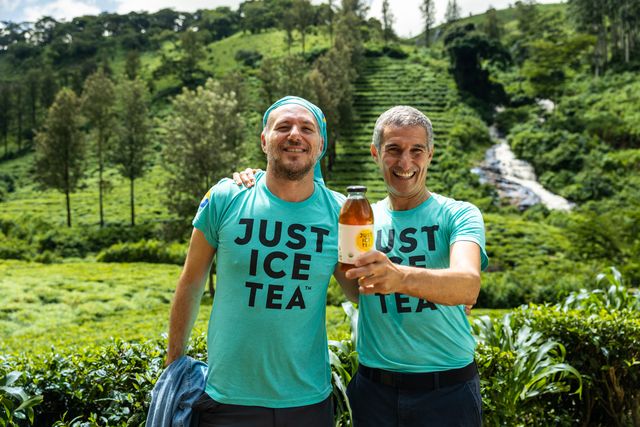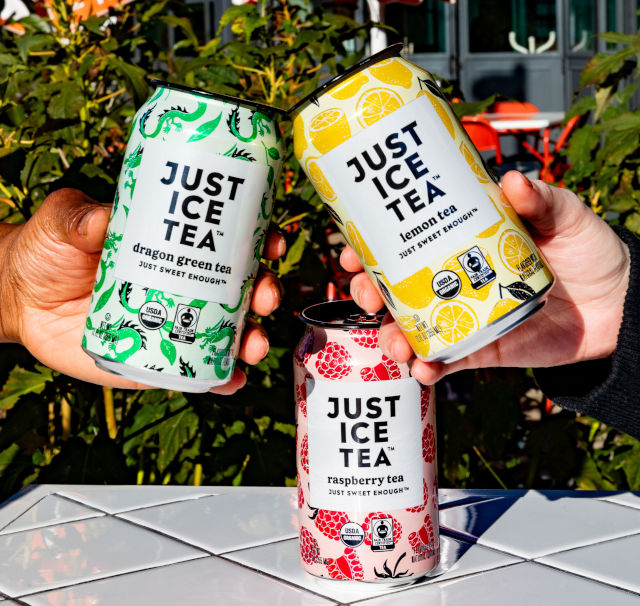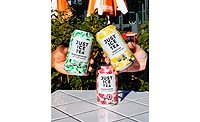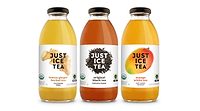JUST ICE TEA’s performance highlights need for authentically brewed tea
Ready-to-drink tea brand adds aluminum can format to lineup

Photo by Evangeline Pergantis
In the first year of a child’s life, one of the biggest shifts for parents is when their baby begins eating solid food. This alters how caregivers approach meal times, but also opens up the world of options to nourish a growing body. Although the introduction to solid foods is a monumental shift in early child rearing, consumers in general are participating in another major shift in how they approach food and beverage consumption.
Seth Goldman, co-founder and chief change agent at Eat the Change, Bethesda, MD, explains that he and Chef Spike Mendelsohn, Eat the Change co-founder, saw this modern shift in consumers, with an emphasis on planet-friendly diets ― all leading to their creation of Eat the Change.
“Spike and I believe that our diets represent our largest daily environmental impact and if we can help consumers shift their thinking, we could have an impact on our ‘foodprint’ as well as on the health of American consumers,” Goldman says. “When we launched the company, we identified Five Planet-Based Commitments that would create guardrails for the kind of products we would create.”
Those Five Planet-Based Commitments are as follows:
- All plant-based: No ingredients used are animal-based.
- Fully organic: “We wouldn’t be supporting the use of persistent synthetic chemicals in pesticides, herbicides, fungicides or in chemical fertilizers,” Goldman says.
- Biodiversity commitment: “By excluding the six most common crops, which represent 57% of all agricultural production,” Goldman says, the company does not use soy, wheat, corn, rice, potatoes or sugar cane in any of its recipes.
- Commitment to reducing food and water waste: “We would seek out ingredients that are environmentally efficient,” Goldman says. When the company selected its snack ingredients, the first recipes focused on mushrooms and carrots, two of the most water-efficient crops, he adds.
- Democratize organics: The company’s formulations are designed to appeal to everyone, not just healthy and wealthy people, Goldman notes. “We would make sure that our recipes, packaging, distribution and pricing would have a wide appeal,” he says.


At the time of its creation, Eat the Change was focused more as a snack-based company. However, all of that quickly changed in 2022 when Goldman, who had founded Honest Tea and eventually sold the company to The Coca-Cola Co., was notified that the Honest Tea brand was discontinuing the brand by the end of the year.
“Well, actually, we had a week of sadness, but after that we realized there were two important impacts of Coke’s decision,” Goldman explains. “First, the organic and Fair-Trade supply chain that we had spent 24 years building was at risk of losing a major customer.
“Second, there was going to be a big market gap ― one that retailers and consumers had helped us establish,” he continues. “And as the news about Coke’s decision sunk in, we quickly recognized that we were the team best positioned to capitalize on that opportunity ― both in terms of commitment to the mission as well as to the consumer.”
All of these factors came together for the creation of JUST ICE Tea, a line of organic and Fair Trade Certified bottled teas.
Important differentiations
With the creation of JUST ICE Tea, many might be wondering where the similarities and differences lie between JUST ICE Tea and Goldman’s first foray in the beverage market.
“There are clearly more similarities between JUST ICE Tea and Honest Tea than differences, and that doesn’t seem to be a problem because Honest Tea is no longer on the market,” Goldman explains. “But there are a few important differences.
“First of all, while Honest Tea was primarily sweetened with organic sugar, JUST ICE Tea is only sweetened with organic agave or honey,” he continues. “Second, while most of Honest Tea’s sales were from its PET bottles, JUST ICE Tea is only packaged in glass and cans. By only using recyclable packaging, we avoid the risk that our packaging will contribute to the spread of microplastics in our ecosystems and bodies.”
Goldman notes that another important differentiation between the brands is that Chef Spike has crafted all the tea recipes.
“[E]ven our Original Black Tea has a subtle tweak of cardamom that elevates the taste,” he says.
More subtle differences might only be noticed by dedicated fans of the initial brand. The phrase “Just A Tad Sweet” has been replaced by “Just Sweet Enough.” The signatures on the bottle also have been updated from “Seth & Barry” to “Seth, Spike & Barry.”
The introduction of JUST ICE Tea to the retail market has been a success, as shown by scanner data.
“In just one year, we have become the fastest-growing brand and the second overall brand in the natural channel,” Goldman says, citing SPINS 52 week data ending March 24.
Citing SPINS 52 week data ending April 21, the company notes that in the natural channel RTD tea is posting single digits, compared with relatively flat in the mainstream category. Within the natural channel, JUST ICE Tea is posting triple digit increases, based on SPINS data.
“According to Nielsen, we are the top ready-to-drink tea at Whole Foods Market, not including Yerba Mate,” Goldman says, citing NielsenIQ Byzzer for the 52 weeks ending March 23.”
Also reported by NielsenIQ Byzzer data, for the 52 weeks ending Feb. 3, is that JUST ICE Tea is one of the Top 5 brands driving growth in the RTD tea category for total U.S. grocery sales, Goldman explains.
This comes as Goldman notes that, until recently, the U.S. ready-to-drink (RTD) tea market has been stagnant.
“It was dominated by ‘the usual suspects’ ― brands that had been around for decades and hadn’t invested in innovation or marketing, and consequently, the category did not see much growth,” he explains. “We are excited to be leading a renaissance in the RTD tea market, along with several other upstarts like Guayaki, St. James Tea and Liquid Death. We expect to see the RTD tea market return to double-digit growth in the years ahead.”

New and old playbooks
In its efforts to meet consumers’ needs for organic and Fair Trade Certified bottled teas, JUST ICE Tea is comprised of the following varietals in its glass bottle line: Peach Oolong, Half Tea & Half Lemonade, Honey Green Tea, Mango White Tea, Moroccan Mint Green Tea, Berry Hibiscus Herbal Tea, Lemon Ginger Herbal Tea, Original Green Tea and Original Black Tea.
Of these varietals, Goldman notes that Peach Oolong is the “clear favorite,” but the brand also is seeing great response to the Half Tea Half Lemonade SKU.
Yet, the creative juices of the Eat the Change is not just limited to the recipes, but also extend to packaging formats. Earlier this year, JUST ICE Tea launched an aluminum can packaging format in three varieties: Lemon Tea, Raspberry Tea and Dragon Green Tea.
Goldman explains that those varietals were selected for the brand’s first foray into aluminum cans as they were the most popular Honest Tea varieties that were not part of the initial JUST ICE Tea glass line, and because the company anticipates they will have the widest mainstream appeal.
“When we launched JUST ICE Tea last year, we wanted to honor and celebrate what Honest Tea stood for, but promised ourselves we wouldn’t be operating with an old playbook,” Goldman says. “The launch of our new canned line is the latest example of our commitment to think more broadly and boldly about where JUST ICE Tea can go.”
He elaborates that the U.S. RTD tea market has changed since the team was last an active participant, pointing to Nielsen data that shows 55.5% of tea is sold in multi-packs.
“We are still committed to our glass bottles, but they are heavy and hard to mention ship in the mail,” Goldman says. “Our canned four-packs will be easier to take home and increase the occasions when people can enjoy our tea.
“The cans should also help support our efforts to democratize organics by making more sustainable and healthier foods/drinks available to more people because of their lower price point,” he continues. “Cans go into new channels where glass isn’t as welcome, such as vending, convenience, health clubs and club stores and online channels.”
Although JUST ICE Tea is using a new playbook when it comes to packaging formats, the brand implemented a winning formula for the distribution of RTD teas.

“Following Honest Tea’s playbook, we have quickly established ourselves as the leader in the natural channel, including Whole Foods, Sprouts and the independent natural retailers,” Goldman says. “Now we are starting to see expansion into more mainstream retailers. And of course, we are already seeing great results in Honest Tea’s historically strong markets thanks to our legacy distribution partners, Big Geyser and the Honickman Group.”
This strategy has proven to be a success for JUST ICE Tea, with Goldman noting that the brand expects to experience higher velocities as awareness and trial increases.
“In one of our top natural retailers, we doubled velocities in promos this year compared to last year,” he says. “We expect this acceleration to continue as we enter the iced tea season.”
Goldman notes that JUST ICE Tea is beginning to emerge on the radar for mainstream buyers, with the Nielsen data serving as compelling evidence for the brand’s potential.
But as JUST ICE Tea looks to enter new channels and retailers, it already has hit a homerun with its most recent distribution deal.
“We are excited to launch JUST ICE Tea as an Official Partner with Major League Baseball’s Washington Nationals,” Goldman says. “Our Dragon Green and Raspberry Black Tea cans are now sold throughout the ballpark.”
To expand its reach within mainstream channels, JUST ICE Tea also signed new direct-store-distribution deals, including in New Jersey with Fischer-Thompson, Seaview and Shore Point, Goldman notes.
The company also is looking to connect with the consumers who were saddened by the shuttering of Honest Tea through its new marketing campaign.
“This summer we’re launching a nationwide campaign to serve justice to our fans,” Goldman says. “We are looking forward to connecting with longtime Honest Tea fans and tea lovers who are excited about the launch of JUST ICE Tea. We heard from tea fans all over the country about how the absence of Honest Tea left them mis-tea eyed. We felt the same.
“Not only were consumers being denied a delicious, organic, freshly brewed, ‘just sweet enough’ tea but our Fair-Trade farmers were left stranded,” he continues. “JUST ICE Tea was born to bring justice to tea fans and tea suppliers alike. While this is just ice tea, we know it means so much more to people and we want to share their stories.”
In tune with the market
JUST ICE Tea’s participation in the RTD tea market comes at a time when Goldman highlights four trends that will drive growth for the category: health, cleaner/natural formulations, alternatives to plastic bottles, and interest in Fair Trade.
“Consumers will continue to seek out healthier options ― with respect to tea this takes the form of lower calorie options, as well as more authentic tea recipes, particularly green tea where there is growing awareness of the antioxidants,” Goldman says. We have also heard increasing concerns around sugar as an ingredient.
“There has been a notable shift in consumer behavior towards drinking less alcohol,” he continues. “Health consciousness, increased awareness of the negative effects of alcohol on physical and mental well-being, and the rise of wellness trends have all played a significant role in this change.”
Regarding cleaner/natural formulations, Goldman says it “starts with simple, authentic recipes without artificial ingredients or tastes but filters into organic and even regenerative sourcing.”
He adds that health and environmental concerns in relation to microplastics is motivating consumers to seek out products in alternative packaging formats.
“I was amazed when we did a crew drive in NYC and all of the corporate offices were not considering any options in plastic,” Goldman says. “As a result, we expect to see a proliferation of offerings in cans, Tetra Pak and glass.”
For the last trend that will drive growth for RTD tea, Goldman points to consumers growing awareness of global labor conditions.
“As consumers continue to read stories about labor conditions in the developing world, tea purveyors are at risk because almost all tea is grown in the developing world, especially countries with plentiful and inexpensive labor,” he explains.
Despite these factors that point toward growth for RTD tea, Goldman highlights that the tea category is facing new challenges compared with 2019, when the team was previously involved in the market.
“First, the whole beverage market has seen a shift toward less sweet taste profiles,” Goldman says. “Although Honest Tea was one of the first to successfully commercialize the ‘Just A Tad Sweet’ taste profile, there are now dozens of brands with that taste profile, including flavored seltzers. So just being less sweet isn’t enough to stand out. There are numerous brands that offer ‘tea flavored’ drinks, but we don’t see those competing with authentic, real-brewed tea.”
But with expertise of the team leading JUST ICE Tea, consumers have a new solution where they can enjoy that authentically brewed tea experience.
Looking for a reprint of this article?
From high-res PDFs to custom plaques, order your copy today!







